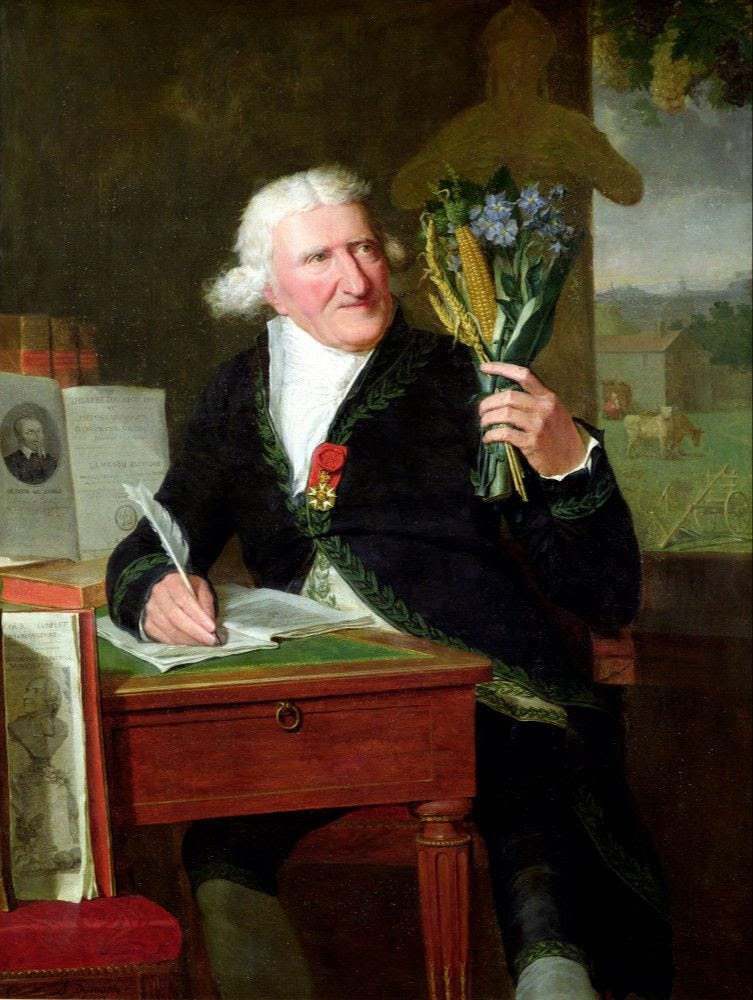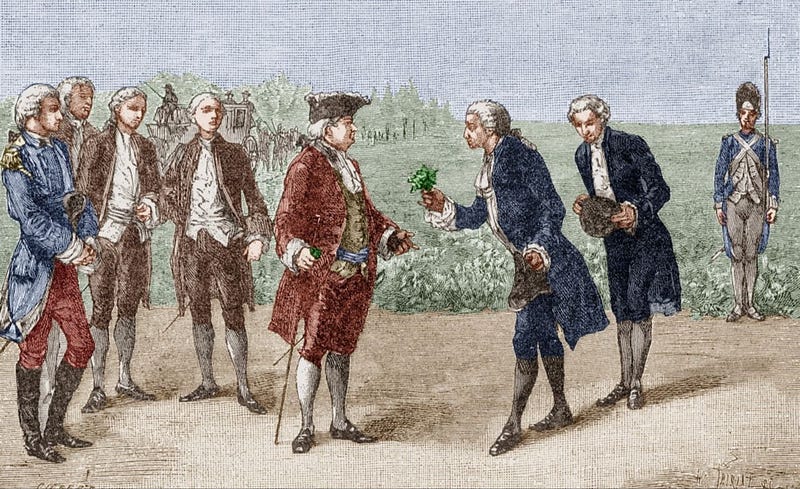How Potatoes Proved Perception is Everything
Nov 28, 2024
It was 1760 and Antoine-Augustin Parmentier had 2 problems:
First, he was a prisoner of war stuck in a Prussian prison.
Second, there was a potato on his plate. And as everyone knew at the time… potatoes were deadly.
A few weeks earlier, Parmentier, an active medical officer in the French Army, had been captured in battle and thrown into prison. But if that wasn’t humiliating enough, the merciless captors subjected him and his fellow inmates with the lowest of human degradations: to grow and eat potatoes.
Here’s why this irked the Frenchmen so much:
Though the potato had been brought over from the Spanish New World in the 16th century, in continental Europe it was considered feed for animals, and the last resort of food for the poor. And when you associate something with filthy animals and the destitute, rumors spread. It was widely believed throughout France that potatoes were the cause of disease and leprosy. That’s why over 10 years earlier in 1748, potatoes were officially banned by the government.
That’s right: the French fried any chance of the potato’s success.
Which brings us to Parmentier in prison. Though at first insulted the Prussians forced him to eat the suspicious spud, over the course of several years he realized: “Hey! I’m not dead! Maybe potatoes aren’t poisonous at all. In fact, they taste quite good and are easy to grow!”

Photo: Parmentier and his plants)
When he was released sometime around 1763, he headed to Paris and over the next decade began a charm offensive evangelizing the nutritious benefits of his favorite taters. He wrote articles, entered into contests, and even hosted parties with the elites and foreign dignitaries (like the American Benjamin Franklin)…all featuring potatoes as the central dish.
But still, the French public weren’t buying it. And so Parmentier tried another idea: influencing perception.
He planted a field of potatoes and paid several armed guards to visibly patrol and protect the perimeter during the day. However at night, he instructed the guards to turn a blind eye and even accept bribes from anyone who wanted to steal the curious crop.
If potatoes were valuable and forbidden, Parmentier thought, then people would want them all the more. And what better way than using armed guards to promote the illusion of desirability?
His plan worked, and over the next several years the potato’s popularity grew. In 1772, French law was overturned as the noble potato was once again made legal, and over the next 20 years Parmentier spread the love of potatoes far and wide. So much so, that in 1785 potatoes were credited with saving Northern France from a sweeping famine, and Napoleon himself later granted Parmentier the Legion of Honour.
Parmentier passed away in 1813 at the age of 76. One contemporary praised him as the “Virgil, Cicero, and Homer of the potato” and today you can visit his grave in Paris which is surrounded by potato plants, and even covered in potatoes lovingly placed by passersby.

(Photo: Parmentier gave potatoes to the King, Louis XVI)
What does this have to do with influence and success?
People don’t accept or reject you. They accept or reject their perception of you. And how you present and frame your value can make the difference between being chosen or being ignored.
Parmentier knew this and when he placed guards around the field, he knew he was influencing people’s perceptions of the potato. In particular he was keying in on one particularly powerful lever of perception: creating scarcity through exclusivity.
Peter Jackson, the award winning director of The Lord of the Rings trilogy, knew this principle of influence and perception too.
In 1995 he and Fran Walsh had the crazy idea of bringing J.R.R Tolkien’s legendary series to life not just in a film… but in THREE films. The only problem was… what studio would be CRAZY enough to fund THREE films of a fantasy epic half way around the world in New Zealand?
He made a demo reel, and flew to London to pitch top executives. However, no one paid him any attention.
That was until, like Parmentier, Jackson created a sense of scarcity and exclusivity. Here’s what he did: When he called the Miramax headquarters, he said he couldn’t meet at a specific time because he had a conflicting (fictitious) appointment with Newline Cinema across town. Then as he called Newline Cinema, he similarly bluffed a meeting with Miramax.
If his films were valuable and in high demand, Jackson thought, then studios would want them all the more. And what better way than using several appointments to promote the illusion of desirability? The resulting exclusivity and scarcity of opportunity nudged Newline to invest and over the next several years, Jackson and Newline partnered together to bring Tolkien’s world… a multi billion dollar franchise… to life.

(Photo: Peter Jackson, courtesy Robert Peterson/AP)
How can you use this principle to your advantage?
People don’t buy products, they buy identities. When people choose you or your product/service over others, what does it say about them? How do you reinforce and validate that positive narrative?
When people stole Parmentier’s potatoes, it made them feel smart and clever as they gamed the system. When the studio chose Jackson’s films, it made them feel strategic and intelligent. And in both cases, people left feeling they had scored a big opportunity that others didn’t see.
And so next time someone is deciding to choose you, how can you make them feel special? How can you make them feel that choosing you is the best thing they could possibly do? If you’d like more ideas, check out The Influence Mindset: The Art & Science of Getting People to Choose You.
Or better yet… ask around the Thanksgiving dinner table.
Just don’t forget the potatoes!
Christian
CHRISTIAN HANSEN has gone behind the scenes in some of the biggest organizations in the world to find out the reasons why some people get chosen and why others don’t. As the #1 bestselling and LinkedIn Top Ten ranked author of “The Influence Mindset: The Art & Science of Getting People to Choose You” Christian helps teams and organizations who want to stand out and be the obvious choice. With degrees from Brigham Young University and The London School of Economics, he’s helped thousands of individuals position and sell themselves. A fan of international communication, history, and choral music, he currently lives in Utah with his wife. Reach him at: TheChristianHansen.com
Its Like Getting a 1-1 Coaching Session
Delivered to Your Inbox.
Join our mailing list to receive weekly Influence Insights that will make you the obvious choice to Decision Makers.
Don't worry, your information will not be shared.
We hate SPAM. We will never sell your information, for any reason.


